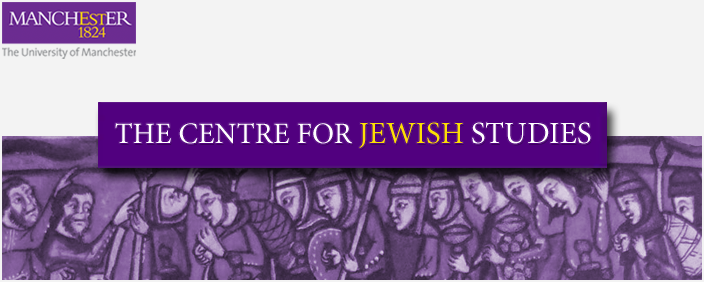Conference 2015 | Call for abstracts | Registration | Keynote Speaker
Programme | Location and Maps | Speaker information
BAJS Conference 2015
Atheism, Scepticism, and Challenges to Monotheism
5-7 July 2015, The University of Manchester
Keynote Speaker: David Ruderman
Are Jews the Only True Monotheists? Some Critical Reflections in Jewish Thought from the Renaissance to the Present
Monotheism, by simple definition, implies a belief in one God for all peoples, not one particular nation. The Jews might have claimed the privilege of conceiving and bringing the doctrine to the world in its original form, but ultimately, it is only meaningful when it transcends its own particular socio-religious setting, when it addresses the condition of all human beings and all cultures. But as the Shemah prayer recalls, God spoke exclusively to Israel in insisting that God is one. This address came to define the essential nature of the Jewish faith, setting it apart from all other faiths both in the pre-modern and modern worlds.
My paper explores the positions of a variety of thinkers on the question of the exclusive status of monotheism in Judaism from the Renaissance until the present day. I begin with the challenge offered to Judaism by the Renaissance thinker Pico della Mirandola and his notion of ancient theology, arguing for a common core of belief among all nations and cultures. I first explore the impact of this universal philosophy of Christianity on a group of early modern Jewish thinkers, consider its developments in the periods of the Enlightenment and the nineteenth century both in Western and Eastern Europe, as well as in more recent Jewish thought until our day. Of course the claim that the Jews are the sole possessors of the monotheistic idea was directly related to the ontological status of the non-Jew in Jewish thought. The theological quandary was intimately linked to the social question of how Jews were to relate to the religious other. Were Moslems and Christians, as opposed to pagan idolaters, monotheists as well, and if so, in what way was the Jewish version of monotheism superior to that of its sister faiths? Moreover, if Jews shared the same belief with other religions, what compelled them to maintain their separate religious identity rather than to embrace a common humanity, Pico’s ultimate ideal?
I close with some reflections on the fate of the preoccupation with the exclusive status of Jewish monotheism among some post-denominational Jewish thinkers in our own present day. For some, the notion of one God is no longer the private treasure of the Jewish people; rather it is their gift to all humankind and binds them rather than separates them from their fellow human-beings. Following this line of thinking, Pico’s vision of ancient theology appears all the more satisfying, connecting the best of Jewish ideas with Christian ones and justifying a fellowship of merged faith and mingled identities.
Biography
David B. Ruderman is the Joseph Meyerhoff Professor of Modern Jewish History, University of Pennsylvania.
Professor Ruderman is the author of, among other works, Kabbalah, Magic, and Science: The Cultural Universe of a Sixteenth-Century Jewish Physician (1988), Jewish Enlightenment in an English Key: Anglo-Jewry's Construction of Modern Jewish Thought (2000), which won the Koret Award for the best book in Jewish History in 2001, Jewish Thought and Scientific Discovery in Early Modern Europe (1995, 2001), which has been published in Italian, Russian, and Hebrew, and Early Modern Jewry: A New Cultural History (2010), which received the National Jewish Book Award in History in 2011. He co-edited with Giuseppe Veltri Cultural Intermediaries: Jewish Intellectuals in Early Modern Italy (2004) and with Shmuel Feiner Early Modern Culture and the Haskalah: Reconsidering the Borderlines of Modern Jewish History (2007).
Professor Ruderman was educated at the City College of New York and Columbia University. He received his rabbinical degree from the Hebrew Union College-Jewish Institute of Religion in New York in 1971, and his Ph.D. in Jewish History from the Hebrew University, Jerusalem, in 1975. He held the Frederick P. Rose Chair of Jewish History at Yale University (1983-94), where he was instrumental in establishing the Judaic studies program. From 1994 until 2014 he was the Ella Darivoff Director of the Herbert D. Katz Center for Advanced Judaic Studies at the University of Pennsylvania. He was awarded the Charles Ludwig Distinguished Teaching Award at the University of Pennsylvania in 2008.
Professor Ruderman has served on the board and as vice-president of the Association of Jewish Studies, and on the boards of the Central Conference of American Rabbis, the Journal of Reform Judaism, the Renaissance Society of America, and the World Union of Jewish Studies. He also chaired the Publications Committee of the Yale Judaic Series, published by Yale University Press (1984-94). He served as president of the American Academy for Jewish Research between 2000 and 2004. He has been the editor of the Katz Center's series in Judaic studies called "Jewish culture and contexts" since its inception and is now its co-editor. He has been a visiting professor at many institutions in the USA, Israel and Europe, and was a fellow at the Institute for Advanced Study at the Hebrew University and at the American Academy in Berlin. In 2001 the National Foundation for Jewish Culture honored him with its lifetime achievement award for his work in Jewish history.




